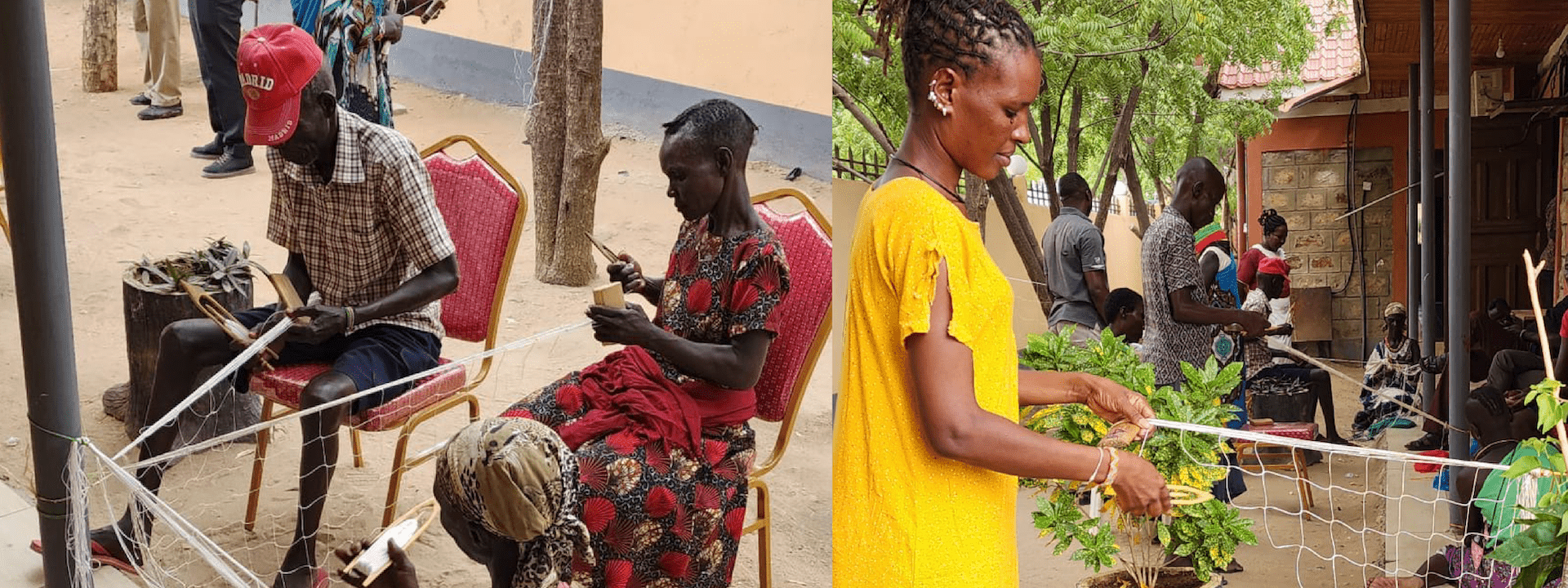July 18, 2024 (Lodwar, Kenya): The Intergovernmental Authority on Development (IGAD), through the European Union-funded ECOFISH Project, in collaboration with the Ministry of Mining, Blue Economy, and Maritime Affairs of Kenya, organised a three-day practical training on gillnet making for the fishing communities in the Omo-Turkana Basin, Lodwar Town, Turkana County, Kenya.
In line with the principles of fisheries co-management, the fisheries co-management document for the Omo-Turkana Basin was developed to involve the fishing communities. The project has established fisheries co-management units in Turkana County to pilot the implementation of the fisheries co-management plan. A capacity gap assessment in the Omo-Turkana Basin recommended minimising the use of illegal monofilament fishing nets due to the scarcity of legal multifilament gillnets. The training equipped community members with the skills to make gillnets and sell them to local fisher communities. This practical training aims to enable women and youth to contribute to reducing illegal monofilament gillnet use and diversify their livelihoods.
In his welcoming remarks, Mr. Kennedy Opiyo, Assistant Director for Fisheries in charge of Turkana County, highlighted the challenges faced by the fishing community, including reduced fish stocks in Lake Turkana. He attributed this to illegal fishing with monofilament nets and fishing in protected areas. He urged the communities to be vigilant and responsible, emphasising the importance of the training in producing and making the recommended multifilament nets available for fishing.
Dr. Eshete Dejen, Programme Manager for the Sustainable Environment Protection Unit of IGAD, speaking on behalf of the IGAD Director for Agriculture and Environment Division, thanked the Government of Kenya for supporting IGAD’s sustainable fishing initiative. He commended the training participants for their commitment to acquiring gillnet making skills, which will improve household livelihoods and food security. Dr. Eshete noted that IGAD is implementing similar initiatives in Ethiopia, Kenya, and South Sudan, and will conduct similar training in other IGAD Member States to promote sustainable fishing in transboundary water bodies. He emphasised the need to avoid using monofilament fishing nets due to their negative impact on the fisheries sector.
Mr. Joseph Mahongah, Fisheries Director from the Ministry of Mining, Blue Economy, and Maritime Affairs, noted the training’s timeliness, given the widespread use of illegal monofilament fishing nets in Lake Turkana. He acknowledged the scarcity of multifilament nets in the lake basin but emphasised that the training would make these nets available to the fishers. He encouraged the women and youth participating in the training to take the initiative seriously and earn a living from the net-making business.
The objectives of the gillnet-making training included equipping the fishing communities with the skills to produce multifilament fishing gillnets, encouraging the use of legal fishing gear, diversifying the livelihoods of the fishing communities, and building their capacity to reduce the use of illegal fishing gear.
Background
The Intergovernmental Authority on Development (IGAD) is a Regional Economic Community implementing the ECOFISH Programme, a Cross-Regional Initiative funded by the 11th EDF to enhance sustainable inland and marine fisheries in the Eastern African, Southern African, and Indian Ocean (EA-SA-IO) region. IGAD received a three-year grant to support the sustainable utilisation, development, and management of fisheries in the Baro-Akobo-Sobat River Basin (shared between Ethiopia and South Sudan) and the Lake Turkana Basin (shared between Ethiopia and Kenya).

